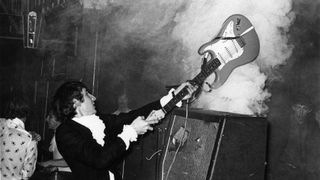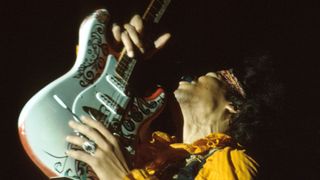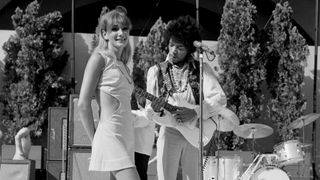Jimi Hendrix’s arrival in London in September 1966 was a storm no one had forecast. Within months, he had assembled the Jimi Hendrix Experience and released three top-10 singles. In doing so, he reshaped England’s rock and roll hierarchy, which until then had been dominated by players like Jeff Beck, Eric Clapton and Pete Townshend
As Townshend told Guitar PlayerHendrix sent guitarists like him and Eric Clapton on a search to find relevance and to re-think their approach to music.
“It did shift my emphasis,” he told us. “I suppose like a lot of people — like Eric — for a while there I think we gave up. And then we started again.”
The result would lead Townshend to craft Tommyhis first of several rock masterpieces and the Who’s critical and commercial breakthrough in the U.K. and America.
But long before that happened, Townshend was reeling from the impact of the Hendrix juggernaut. He and Clapton weren’t the only electric guitar heroes of the day floored by the American guitarist. Jeff Beck also revealed how Hendrix “swept us all aside and put us in a bin.”
“He was discovered and went onto Track, which we co-owned at the time. So he was actually on our record label!”
— Pete Townshend
Townshend’s circumstances were unique, however, as he revealed to Guitar Player in a September 1989 cover story. For a start, Hendrix was too close for comfort. Literally.
“We were on the same record label,” Townshend said. “He was discovered by (Animals bassist) Chas Chandler and brought over and went onto Track, which we co-owned at the time. So he was actually on our record label!”
Moreover, Townshend — unlike Clapton and Beck — had developed his own highly physical guitar style: windmilling his strumming arm, stalking the stage and destroying his guitars and amps at the end of a show. Hendrix put all these to use in his performance, and went further by setting his Fender Stratocaster on fire at the 1967 Monterey Pop Festival. In doing so, he co-opted the key elements of Townshend’s identity as a performer.

While Townshend recognized that Hendrix was “dealing in other people’s ideas, old blues things and tricks” and employing “the pyrotechnic things that he had caught off watching me,” the effect on him was devastating.
“It destroyed me,” Townshend said. “Absolutely, completely destroyed me.”
But it was Hendrix’s impact on the music itself that affected Townshend most. As successful white artists playing music inspired by Black musicians, the Who — like other British Invasion acts — had built entire careers and identities. Hendrix reclaimed the music inspired by Little Richard, Bo Diddley, Chuck Berry and other Black rock and roll originators, leaving Townshend feeling like a pale imitation.
“I mean, I was glad to be alive, but it was horrifying. Because he took back Black music,” Townshend said. “He took R&B back. He came and stole it back. He made it very evident that that’s what he was doing. He’d been out on the road with people like Little Richard, had done that hard work, and then he’d come over to the U.K. And when he took his music back, he took a lot of the trimmings back, too.”
Those trimmings — the physicality and equipment destruction — had been adopted by Townshend out of his frustrations with his limitations as a guitarist. Seeing a guitarist as skilled as Hendrix come along and claim the entire scene caused Townshend to retreat and recalibrate, as it did Clapton and Beck.
“It was very strange for Eric and me,” he says. “We went and watched Jimi at about 10 London shows together, and (Clapton) wasn’t with a girl at the time, so it was just me, my wife-to-be Karen, and Eric, going to see this monstrous man.”
Townshend was further intimidated by Hendrix’s obvious love for Clapton, and his apparent disregard for him.
“It got to the point where Eric would go up to pay his respects every night, and one day I got up to pay my respects, and he was hugging Eric, but not me — he was kind of giving me a limp handshake — just because Eric was capable of making the right kind of approach to him. It was a difficult time.”

If Hendrix intended to demoralize Townshend, he didn’t need to try. Jimi’s innate confidence left other men feeling inadequate.
“You have to remember the other thing about him, that he was astonishingly sexual,” Townshend said, “and I was there with my wife, you know, the girl I loved. And you could just sense this whole thing in the room where every woman would just (claps) at a snap of a finger. I mean, there were situations sometimes where Jimi would do it. He wasn’t particularly in control of his ego at the time. There was this slightly prince-like quality about him, this kind of imp at work. I found him very charming, very easy, a very sweet guy.
“He went up to Marianne Faithfull when she was there with Mick Jagger, and said in her ear, ‘What are you doing with this asshole?’”
— Pete Townshend
“You know, I just kept hearing stories. I mean, one story I’ve heard — I think I might have been there — was the night that he went up to Marianne Faithfull when she was there with Mick (Jagger), and said in her ear, ‘What are you doing with this asshole?’ There were moments like that when he would be very, very attracted to somebody and felt that he would actually be able to get them, and he just couldn’t resist trying. There were no boundaries, and that really scared me.

“And slowly but surely, Jimmy became sure of himself. I’m talking about the first two weeks he was in London. You know, it was a new band, and they were just taking London by fucking storm! You can’t believe it. You’d look around and the audience was just full of record company people and music business people.”
Eventually, Hendrix’s effect on Townshend cut to his core, impacting his identity as a man and creator, and even his psyche.
“I had a lot of spiritual problems. I asked my wife to marry me before it was too late and started work on Tommy a bit later.”
— Pete Townshend
“I suppose I went away and got very confused for a bit. I kind of groped around, I had a lot of spiritual problems. I asked my wife to marry me before it was too late (laughs), and started work on Tommy a bit later. I just sort of felt that I hadn’t the emotional equipment, really, the physical equipment, the natural psychic genius of somebody like Jimi, and realized that what I had was a bunch of gimmicks which he had come and taken away from me and attached to not only the black R&B from whence they came, but also added a whole new dimension. I did actually feel stripped, to some extent, and I took refuge in my writing.
“The weirdest thing of the lot is that, although people really, really value those early years, the Who was not a particularly important band at that time. We were at the end of an era; under normal circumstances the band should have just disappeared. But because he came along and, kind of like in early punk, just swept everything aside, I had to learn to write, and it became like a new art, from a new angle.”
But Hendrix’s success in England and, eventually, America would also help pave the way for the Who to find success in the States. Both acts made their debut at Monterey Pop in June 1967, after which they went on to become established recording artists in America. For the Who, it began shortly after Monterey with the September 1967 release of “I Can See for Miles,” Townshend’s psychedelic-rock masterpiece and the group’s first top-10 single in the U.S. Townshend understood that, as much as Hendrix stripped him of the music and trappings he used in the Who’s first era, he also laid a way for the group to move on and build a new audience.
“And what that actually did was provide me with records that sold in America, somehow,” Townshend said. “I don’t know why that is.”
GIPHY App Key not set. Please check settings